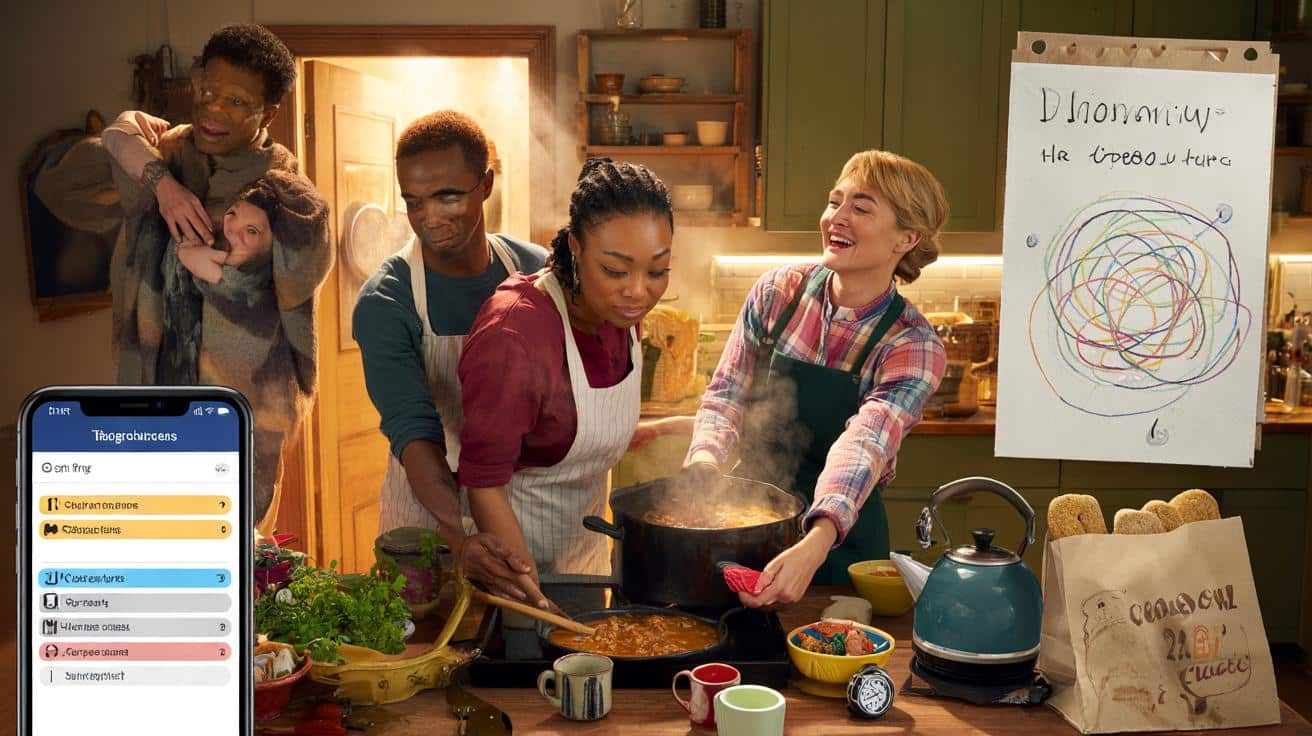A new kind of love map is quietly appearing in group chats, kitchen tables and park picnics. Not a couple, not a triangle, but a network — people who date one another, or date someone who dates someone. It looks messy on paper and oddly ordinary in person. It raises tricky questions about jealousy, time, family and the neighbours. It also offers a different answer to a very old desire: to be seen fully, without pretending that one person can be everything, always.
Ella salts the stew, Jay tastes, Mo nods, then someone’s phone pings: “Sam’s on the way.” Another ping: “Bring extra bowls.” The laughter is light, domestic, unremarkable, until we start talking about who is dating whom, and who calls whom when someone’s ill.
There’s a scribbled diagram on the back of a takeaway menu — circles, arrows, initials. They call it their polycule. A web, not a ladder. Someone mentions a metamour, the word for your partner’s partner, and the room shrugs like it’s the most ordinary thing in Britain now. Then someone sketched a triangle, added a dot, and smiled.
Why polycules are showing up now
The idea of a polycule sounds edgy until you watch people make tea and fold laundry together. It’s not a dating stunt; it’s logistics, care, calendars. People are choosing networks because life already happens in networks — housemates, co-parents, best friends who are practically family. Many are simply dropping the polite fiction that love can only move in straight lines.
Polling in the UK and US has found a steady share of adults who say they’ve tried or would consider consensual non‑monogamy, with younger people the most curious. Dating apps now offer settings for “open to non‑monogamy”, and local meetup groups for ethical non‑monogamy fill up on weeknights. In Manchester, I met a woman who described the relief of not being the sole emotional helpline for her partner — “I’m not the only 2am call anymore, and I sleep better.”
Why now? Costs are up, time is thin, and the pandemic nudged many into asking what intimacy should actually feel like. Queer communities normalised chosen family years ago; straight circles are catching up. Social media turned visibility into a lever, so people see models of love that don’t end at a wedding photo. Technology helps with the boring parts — shared calendars, group chats, transport — which is where many relationships either breathe or break.
How people make a polycule work
One practical move keeps coming up: the weekly check‑in. Sit down, phones face down, and talk about capacity, plans, and any feelings that are easy to ignore until they explode. Some keep it to twenty minutes with a timer; others do a proper agenda — highs, lows, requests, appreciation. *Love is a verb, not a job title.*
There’s also a learning curve with jealousy. People who thrive in polycules tend to treat it like weather: you can’t stop rain, but you can bring a coat. Name the feeling, ask what it’s pointing to, and get specific. Let’s be honest: nobody actually does this every day. Still, small rituals help — a text when you get home from a date, a photo of the view, a quick check with a metamour over coffee just to be human.
Think less about rules, more about agreements you can review. Over‑prescribing kills trust; clarity grows it.
“Jealousy is data, not a directive,” says Aisha, a London therapist who sees more polycules each year. “It asks for attention, not punishment.”
Try a simple framework in the early months, then refine it together.
- What does quality time look like for each person this week?
- Which boundaries protect your sleep, work and health?
- What counts as a heads‑up versus a permission slip?
- How will you repair after a wobble?
What a polycule feels like up close
On a different Tuesday, in a Leeds terrace, I watched two metamours share a taxi after karaoke. One handed over paracetamol, the other sent a meme the next morning. We’ve all had that moment where someone else adores the person you adore, and it stings before it softens. In a polycule, that moment is named, witnessed, worked with. Sometimes it turns into something many swear by: compersion, the odd pleasure of seeing your person lit up by someone else.
Of course, every network has edges. Parents with young children often prefer a cosy, “kitchen‑table” style — yes, literally everyone round the table — over juggling secrets and corridor handovers. Others keep it parallel, private, and calm. There isn’t one correct template for a polycule, only a shared appetite for telling the truth early, then making room for reality. And when it works, the home feels less like a stage and more like a garden.
There’s a Britishness to it too: dry humour in the group chat, a rota for bins, mismatched mugs. The boldest part isn’t sex; it’s admin and tenderness. A nurse from Bristol told me her favourite bit is the Sunday shop with a partner and a metamour, arguing over which biscuits to buy. She calls their version kitchen‑table polyamory, and swears the kettle holds the whole thing together.
What to try if you’re curious
Start with a low‑stakes audit of your time and energy before you download any app. Who do you call when things go wrong? What does enough rest look like? Then write a one‑page “relationship user manual” — how you like to communicate, what shuts you down, what a bad day sounds like. Share it, invite edits, and update it monthly like you would a budget.
Common snags are simple: overpromising, under‑sleeping, skipping the check‑in when life gets busy. Don’t copy someone else’s rules wholesale because a podcast made them sound tidy. Your capacity is a moving target, and your partners’ capacity will move too. Speak plainly, and be kind when people fumble. Jealousy isn’t a villain; lying is. Your calendar is your friend; so is leaving a night blank.
Quality beats quantity. Two well‑tended connections will feel better than six half‑starved ones.
“People imagine drama,” says Mo from South London, “but the magic is boring: text back, turn up, keep your word, eat together.”
If you need a starter pack, use this tiny checklist:
- Set a weekly check‑in with two questions: “What changed?” and “What do you need?”
- Add shared calendars with “soft holds” for potential plans.
- Agree a default repair ritual: tea, a walk, three honest sentences.
- Make space for metamours — even just a hello message.
A wider shift, or just better language?
Polycules aren’t a fad so much as a name for a thing people were already doing quietly, with more shame and fewer words. The label gives permission, but the daily craft stays the same: care, boundaries, courage, time. Some will try it and decide monogamy is their best home, now with a clearer view of what they value. Others will find that love multiplies when it doesn’t have to impersonate scarcity. The real question isn’t who you’re allowed to love; it’s how you want to live with the love you have. That’s a kitchen‑table question, and it keeps changing as we do.
| Point clé | Détail | Intérêt pour le lecteur |
|---|---|---|
| Polycules in practice | Networks of care, not just dates; agreements over rules | Shows what it looks like day to day |
| Tools that help | Weekly check‑ins, shared calendars, repair rituals | Gives a starter kit you can try tonight |
| Mindset shifts | Jealousy as data, compersion as a skill, capacity as finite | Reduces drama, increases calm and honesty |
FAQ :
- What is a polycule, exactly?A web of connected relationships — partners and metamours — rather than a single couple. It maps how people relate, not who ranks where.
- Is this the same as cheating?No. Cheating breaks agreements. Polyamory is consensual, transparent, and negotiated. The honesty is the point.
- How do people handle jealousy?By naming it early, asking what it signals, and using agreed repair steps. Think curiosity, not control.
- Is this legal in the UK?Yes to multiple relationships; no to multiple marriages. Cohabiting and parenting can be arranged with good legal advice.
- What about kids and family life?Many focus on stability and clarity of roles. Children tend to care more about care than labels.










This is the first piece that made polycules feel ordinary instead of performative. The tea, the check‑ins, the repair ritual — that’s the useful bit. Seeing jealousy framed as data, not doom, really lands. I’d love a template for weekly agendas or shared calenders. Thanks for the gentle, practical tone.
Honesty sounds great, but what stops subtle coercion — partners agreeing from fear of being left? How do you check that “consent” is freely given, not coersed, week after week? Curious about safeguards beyond vibes, especially for newer folks who don’t yet know their limits.